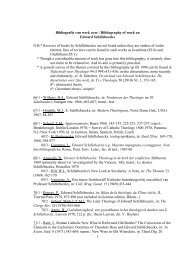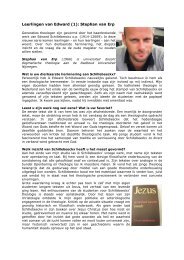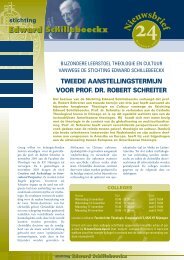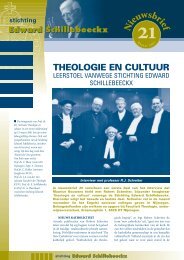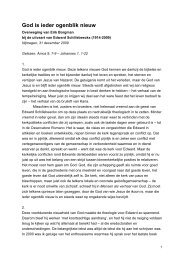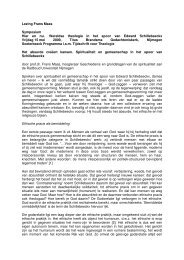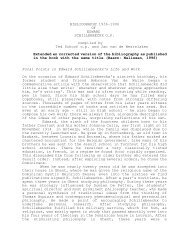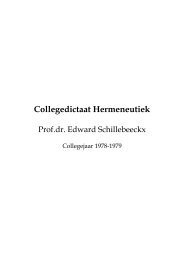Hans Hamers - Stichting Edward Schillebeeckx
Hans Hamers - Stichting Edward Schillebeeckx
Hans Hamers - Stichting Edward Schillebeeckx
You also want an ePaper? Increase the reach of your titles
YUMPU automatically turns print PDFs into web optimized ePapers that Google loves.
formulating this constant. It seems to me that <strong>Schillebeeckx</strong> here points to the primordial<br />
relationships among mankind, as a specific aspect of universality of salvation.<br />
Thirdly, part of the human identity is the fact that men live in social and economic<br />
contingent changeable structures. They exist often in the form of institutions. They implicate<br />
also norms and values concerning the human life. This is needed to be able to live as a<br />
society, but the structures also enslave people, and hinder forms of liberation. So ethics<br />
comes into play. This forms the social and economic dimension of salvation, as liberation. 10<br />
In the practice of spiritual care people do mention the social injustice that they experience<br />
from within the institutions, thereby often aiming to a much wider context than their own<br />
social network.<br />
The fourth anthropological constant: man cannot detach himself from his rootedness in time<br />
and culture/nature. So his existence is historical. It shows the finiteness of man, and the<br />
necessity of adopting a standpoint outside time and space so he can understand his<br />
humanity, in a hermeneutical way. Sciences, in a way, help this understanding, but it<br />
remains an understanding of our humanity as a remembered truth, so always as it was up till<br />
now. But life has to be lived, be realized, so throwing its implications into the future. This<br />
way of understanding is a way of experience, and therefore just as universal as history itself.<br />
“That means that the presumption of adopting a standpoint outside historical action and<br />
thought is a danger to true humanity.” From spiritual care perspective: just acting<br />
medically, outside the historical action, or life story of a patient, is a danger to true<br />
understanding from man to man in patient contact in a true and meaningful relationship. 11<br />
This constant is heavily reflected in the approach of ‘levensbeschouwelijke counseling’ (i.e.<br />
‘philosophical / ideological counselling’) as developed by Evers (2011). 12 In this approach<br />
the patient is invited to tell his life story from four different perspectives: from the existing<br />
factual status, the future, his life as a life story and from the reflective overall meaningful<br />
perspective.<br />
The fifth constant is the mutual relationship between theory and practice. It refers to the<br />
constant hermeneutical undertaking of man to give meaning, changing it and improving the<br />
world. This is a permanent process, that on the human level is ‘the only humanly responsible<br />
guarantee of a permanent culture which is increasingly worthy of man – of what brings man<br />
salvation.’ 13 Within the framework of spiritual care, the first thought that comes up to me, is<br />
that the scientific progress in medical and social sciences, in general is considered by<br />
<strong>Schillebeeckx</strong> as salvific. A critical note nowadays concerning the health practices in West-<br />
European countries is that the human dignity threatens to be lost, or receives less attention.<br />
The approach to the patient in his wholeness is at stake.<br />
10 Ibid. pp. 737-738<br />
11 Ibid. pp. 738-739<br />
12 Evers, H. (2011). Masterclass Levensbeschouwelijke Counseling<br />
13 <strong>Schillebeeckx</strong>, E., p. 740<br />
5



